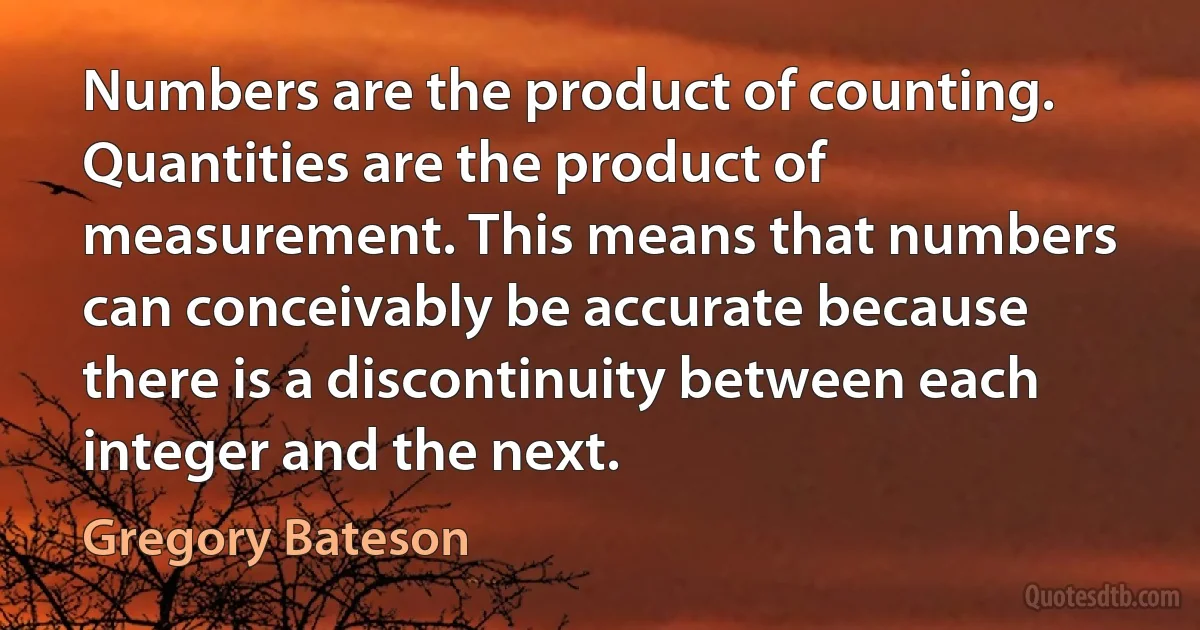Integer Quotes
Numbers are the product of counting. Quantities are the product of measurement. This means that numbers can conceivably be accurate because there is a discontinuity between each integer and the next. Between two and three there is a jump. In the case of quantity there is no such jump, and because jump is missing in the world of quantity it is impossible for any quantity to be exact. You can have exactly three tomatoes. You can never have exactly three gallons of water. Always quantity is approximate.

Gregory Bateson
Planck's quantization assumption applied to the matter that emits and absorbs radiation, not to radiation itself. As George Gamow later remarked, Planck thought that radiation was like butter; butter itself comes in any quantity, but it can be bought and sold only in multiples of one quarter pound. It was Albert Einstein (1879–1955) who in 1905 proposed that the energy of radiation of frequency ν was itself an integer multiple of hν.

Steven Weinberg
He could remember the idiosyncrasies of numbers in an almost uncanny way. It was Littlewood who said that every positive integer was one of Ramanujan's personal friends. I remember once going to see him when he was ill at Putney. I had ridden in taxi cab number 1729 and remarked that the number seemed to me rather a dull one, and that I hoped it was not an unfavorable omen. "No," he replied, "it is a very interesting number; it is the smallest number expressible as the sum of two cubes in two different ways."

G. H. Hardy
The number of syllables in the English names of finite integers tends to increase as the integers grow larger, and must gradually increase indefinitely, since only a finite number of names can be made with a given finite number of syllables. Hence the names of some integers must consist of at least nineteen syllables, and among these there must be a least. Hence "the least integer not nameable in fewer than nineteen syllables" must denote a definite integer; in fact, it denotes 111, 777. But "the least integer not nameable in fewer than nineteen syllables" is itself a name consisting of eighteen syllables; hence the least integer not nameable in fewer than nineteen syllables can be named in eighteen syllables, which is a contradiction. This contradiction was suggested to us by Mr. G. G. Berry of the Bodleian Library.

Bertrand Russell
We started out in the middle ages creating music which had certain desirable physical properties (for example, a major chord sounds "nice" because the frequencies are in integer ratios to each other). And then as society evolved, we created these emotional contexts for certain instruments and progressions. Major-chord arpeggios sound "happy", minor chords sound "sad", chromatic scales can sound "scary", et cetera. In the 20th century, film soundtracks reinforced this point as people associated certain kinds of music with certain visual and emotional experiences. It's a giant feedback loop, really; once you grow up in a given culture, it leaves this musical fingerprint on you which colors your experiences.

Andrew Sega
It always seems to me absurd to speak of a complete proof of a theorem being rigorously demonstrated. An incomplete proof is no proof and a mathematical truth not rigorously demonstrated is not demonstrated at all. I do not mean to deny that there are mathematical truths, morally certain, which defy and will probably to the end of time to defy proof, as, e.g. that every indecomposable integer polynomial function must represent an infinitude of primes. I have sometimes thought that the profound mystery which envelops our conceptions relative to prime numbers depends upon the limitation of our faculties in regard to time, which like space may be in its essence poly-dimensional, and that this and such sort of truths would become self-evident to a being whose mode of perception is according to superficially as distinguished from our own limitation to linearly extended time.

James Joseph Sylvester

